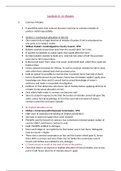Class notes
Cases on Mistake
- Course
- Institution
These lecture notes include a detailed outline of all the relevant topics for each module, as well as detailed notes, analysis, cases and explaination of the topics. They are taken directly from professors lecturing at the City Law School, for first and second year Law. All the cases have a short ...
[Show more]



